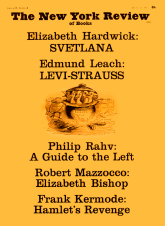In response to:
Man Without Art from the June 15, 1967 issue
To the Editors:
I wonder, after reading Professor Donoghue’s assessment of Céline as an artist, whether judging Céline as a novelist is not applying the wrong yardstick, whether Céline should not rather be viewed as a satirist. Swift’s saeva indignatio is everywhere in evidence, and the frothing, disillusioned idealist shows through at every turn. There is rebellion—violent, indeed, and sometimes merely petulant—against exile from some Eden, and the dominant note of Céline’s work appears to be, “…and only man is vile,” or, as a wise old French lady used to say after listening to the news on the T.S.F., “L’humanité me fait horreur.”
What Céline rebels against are the manifestations of what used to be called “original sin,” mostly in the form of power elites, whether they quote the Bible or Das Kapital, and the corruption they foster for their aggrandizement, and to a considerable extent against the human condition itself; hence perhaps his self-denigration. It is to be wondered, however, whether the latter was not part of his art as a satirist; certainly, the violence with which Professor Donoghue faults Céline qua novelist is an indispensable tool to Céline, the satirist. What satire from Cervantes through Swift has not thrived on exaggeration and caricature?
Part of the violence—the caricature involved—forms at least one aspect of his anti-Semitism. Here the “violence” takes the form of oversimplification for effect: Céline reaches for the nearest symbol of power and blames everything on the “Jews.” The device was reprehensible, shoddy, inaccurate, but served the purpose of his savage attack on the Establishment. Céline’s attitude toward the Jews was ambivalent, in any case. It is quite clear that he did not like Jews; yet at the same time the man to whom Ferdinand goes for help—his “pote“—in Bagatelles pour un massacre is a Jew. André Gide, at least, felt—and said so plainly—when he was in New York shortly after publication of Bagatelles that the book was a satire on Goebbels and the whole Nazi campaign of anti-Semitism.
There is plenty of internal evidence in Bagatelles that Céline wrote tongue in cheek in that particular diatribe against Jews. The charges made are so ludicrous that it would be absurd to assume that the man who in the same book rather shrewdly analyzes the workings of the power elites and brings off some delightful pastiches of French critics was so naïve as not to be aware of the grossness of the charges. There is also this: the careful contrivance of a framework for the whole diatribe, the putting it between quotation marks, as it were, by making the “I” of the book out a psychopath through the conversations between Ferdinand and his “pote” at the beginning and at the very end of the book.
Considered as satire, the art is very much there. As for Professor Peyre’s comments on Céline, which Professor Donoghue quotes, those strike me as illconsidered, to say the least. If Céline is to be called a “mythomaniac” and a “liar”—a charlatan, in short—then it might be well to recall that a degree of charlatanism is of the essence of the writer of fiction. As one of Professor Peyre’s former colleagues, at the Sorbonne, used to put it even more inclusively, “Tout artiste est un peu cabotin“; Victor Basch excepted only Beethoven from that stricture, if stricture it is, rather than a mere statement of fact. And as for Céline’s having been a “slave to an argot already quaint,” how would Profesor Peyre describe Georges Courteline? There are those who feel that Céline’s genius for argot is second only to that of Courteline and that he is in direct line from Rabelais, and that his sensitiveness to language, when he puts his mind to it, comes close to that of Joyce.
Professor Donoghue measures Céline against Dostoevsky. Granted that Céline falls far short on humanity, or humanity in him has turned sour; on the other hand, he does not come off too badly as prophet and weathervane. The “general rottenness of things” against which Céline protested would appear to be precisely the cause of our young people’s disaffection from what the world has to offer them. They “want out”; so did Céline, thirty years ago, with this exception that Céline still had the reformer’s hope of tongue-lashing the world into his Blakeian dream of what the world ought to be.
Victor White
Taos, New Mexico
This Issue
October 12, 1967



